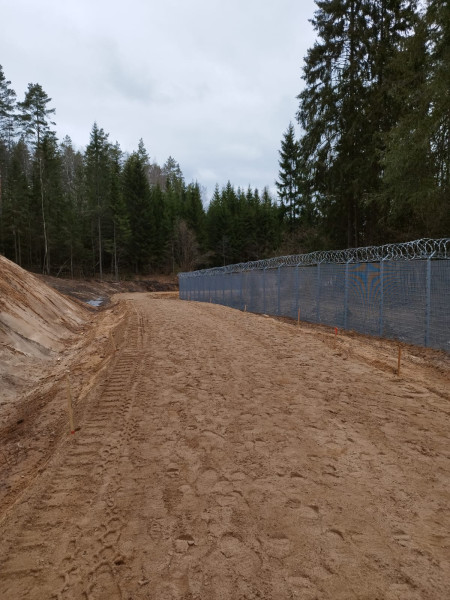








In April, second phase (63.9 km) construction works of stand-alone fence on the Latvian-Belarusian border will commence, while in four parts of the first phase works (85.8 km) – in the dry zones – construction works of the fence have been completed and the works are being transferred to the client, informs Mr Renārs Griškevičs, Chairman of the Board of the State Joint-Stock Company "Valsts nekustamie īpašumi" (VNĪ).
"We are now seeing tangible results of the work that has been done, which allows us to start construction of the stand-alone fence within the stages included in the second phase without undue delay. Important - with the cooperation of all parties involved in the project, we have managed to resolve most of the problems that delayed the expropriation works last year, so we are confident that the first phase of the fence will be completed as scheduled in early autumn this year, while the second and third phases will proceed according to schedule", emphasises Mr Griškevičs.
At the beginning of this week (3 April), construction of approximately 54 km of fence has been completed within the first phase, and four phases of work are being transferred to the client (VNĪ). In a small part of the swampy areas, construction has been postponed until the summer, when it will be possible to build them in compliance with labour safety requirements.
"The weather conditions this winter were not favourable to continue work in the swampy areas. They will resume when the ground is not so loose and the air temperature stays permanently above 10 degrees. Part of the challenge is related to the terrain, as the border infrastructure has to be built also on steep slopes and in swampy areas, while roads have to be safe to drive on. We create construction solutions for roads and drainage systems that are cost-effective, safe to use and easy to maintain", explains Ms Jūlija Zandersone, Chief-Executive Officer of the general contractor LLC (SIA) “Citrus Solutions”.
In the first phase of deforestation has been in fact complete. In the second phase, area of 11.15 km has been deforested, allowing for commencement of the construction of the stand-alone fence in April. In the second phase, design works also continue.
In the third or Daugava phase, design and construction of six communication towers with access roads could start soon - the construction contract is currently being finalised. Development of the technical specifications for the patrol paths provided for in the Daugava section for the optimisation of work schedules takes place together with the SJSC (VAS) “Latvijas Valsts radio un televīzijas centrs” (LVRTC).
In parallel with the construction of the fence, preparatory works for the equipment of fence with modern technologies have commenced; responsibility for the construction and implementation of the border's technological infrastructure has been granted to the LVRTC.
Construction of the border zone Latvia and Belarus covering the total distance of 173 km has been provided for within the project. The first phase of the fence 85.9 km long will be completed by early autumn 2023, while the second phase of 63.9 km and the third phase of ~16.7 km - by the end of 2024. Total construction costs of the first two phases of the border infrastructure amount to €102.7 million. Budget for the six communication towers with access roads (design, author’s supervision, construction works) to be built within the third phase is estimated at around €3.6 million (including VAT). These are planned to be covered with the support of the EU funds.
Implementation of the Eastern Border Construction Project is supervised by the Outer Border Infrastructure Construction Supervisory Committee, which consists of representatives from the Ministry of Defence, Ministry of Foreign Affairs, Ministry of Economics, Ministry of Transport, Ministry of Agriculture, Ministry of Environmental Protection and Regional Development, State Border Guard, Provision State Agency, SJSC (VAS) “Latvijas Valsts radio un televīzijas centrs”, JSC (AS) “Latvijas Valsts meži”, Latvian Geospatial Information Agency and the National Armed Forces.
For up-to-date information on construction works on the Latvian-Belarusian border, please visit VNĪ website.
VNĪ successfully implements 44 projects of national importance, 24 of which are under construction. The total implementation budget of the projects exceeds EUR 336 million. VNĪ provides professional real estate management and administration for 352 building and structure properties, comprising 1000 buildings with a total area of 0.95 million square metres, as well as land beneath structures with a total area of 607 hectares, and 3460 land properties with a total area of 907 hectares. VNĪ is one of 23 Latvian companies that received the highest platinum award in the Sustainability Index evaluation of the Institute for Corporate Sustainability and Responsibility, demonstrating good governance and sustainability of its operations. The company was founded in 1996 and the Ministry of Finance is its sole shareholder.

